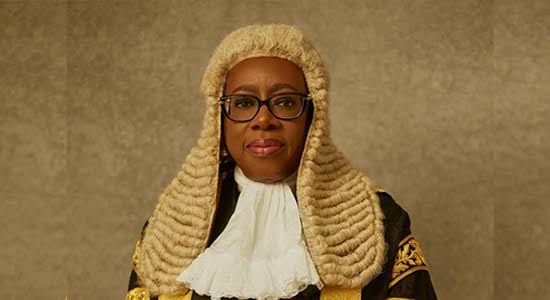The Chief Justice of Nigeria, Justice Kudirat Kekere-Ekun, says that the Nigerian Judiciary has a lot of upright knowledgeable, hardworking and courageous judges, but lamented that there are a few tarnishing this reputation.
The CJN made this known on Saturday at a public discourse in Lagos which had the theme, “Ethics, Morality And The Law”.
The event was held in honour of Justice Habeed Abiru who was recently elevated as a justice of Supreme Court Justice.
Justice Kekere-Ekun, who was the Chairperson of the event, used the opportunity to advice all judges to remember that as “individuals, each person is accountable to his or herself and to God”
She stressed that public acceptance of the law also hinges on its alignment with fundamental principles, the need for clarity, stability and independence of the judiciary, as well as the fair exercise of authority by law enforcement.
She added that the perspective of the ordinary citizen, who observes and assesses the extent to which ethics, morality and the law coexist harmoniously in society must be taken into consideration.
According to the CJN, the foundations of justice that we rely upon today, are influenced by the Abrahamic faith prevalent in our society, adding that both Islam and Christianity preach morality uprightness and righteousness.
She said “The role of the legal practitioner within this framework, merits particular attention. The lawyer, often seen as both antagonist and protagonist in the pursuit of justice, must navigate a terrain, where law, ethics and morality intersect.
“This dual role requires balancing the scriptures and the law with ethical constitutions, often containing with moral and legal questions that may seem at odds. As a minister in the temple of justice, the lawyer’s commitment to justice involves upholding legal standards, while advancing principles that follow society’s ethical expectations.
“The essence of the students is indeed the study of this relationship between morality, ethics and the law, especially when considering the historical distinction between courts of law and courts of equity, which reflects humanity’s ongoing quest to balance justice with fairness.
“The degree to which this alignment is achieved influences public trust in the judiciary and the law, affirming that our legal system should not only administer justice, but also resonate with the community’s moral convictions.
The CJN states that “It is essential, however, to recognize for societal advancement, law cannot be supplanted by moral or ethical indications alone, given the diversity of moral and ethical perspectives.
“The assertive nature of the law is therefore indispensable for peace, order and security, goals that cannot be reliably achieved through ethics and morality alone.
“Public acceptance of the law also hinges on its alignment with fundamental principles, the need for clarity, stability and independence of the judiciary, as well as the fair exercise of authority by law enforcement”.
She congratulated Justice Habib Adewale Adiru on his elevation to the Supreme Court of Nigeria, adding that it was well deserved
In his remarks at the event, Emir of Kano, His Highness, Khalifa Muhammad Sanusi II asked Nigerian judges especially justices of the Supreme Court to administer justice with the fear of God, and remember that they are accountable to God.
The Emir, who said his new year resolution is that, he no longer wants to be controversial, however urged the judges to be upright and should not allow hatred for people to make them to do what is not right.
He said judges should focus more on substantive justice, and not rely on technicalities
“Do not be an advocate for wrongdoers and do not be an advocate for those who deceive themselves, because Allah does not love sinful wrongdoers.
“When your friends come to you, when government comes to you, and you listen to them and you tilt judgement in their favour. Ask yourself, who will be your advocate before God, on the Day of Judgment?
Speaking on the theme “Ethics, Morality and the Law – Christian Perspective, the Very Reverend Professor Konyinsola Ajayi SAN condemned what he termed “lawlessness in the law” and urged Nigeria’s legal professionals to reflect on the role of ethics and morality within the judiciary.
Ajayi cited specific cases as examples of the judicial system’s failure, including the controversy surrounding the Emir of Kano, which he described as “an emanation of lawlessness.”
He questioned whether the rule of law truly underpins current judicial practices, adding that decisions the courts often confused the public rather than provide clarity.
He said “The law today is providing the greatest uncertainty you can think about. The Nigerian judiciary was one of the best in the world. Australia, New Zealand, and the Commonwealth referenced Nigerian court decisions,” he said. However, he acknowledged that today’s legal system suffers from an erosion of this reputation due to inconsistent judgments and a perceived lack of accountability among judges.
Addressing the religious implications of the judiciary’s role, Ajayi appealed to the moral and ethical responsibilities that judges bear. “God is the author of morality and ethics. He created the law and requires it to be underpinned by these things,” he stressed, drawing parallels between judicial conduct and religious values. He urged judges to remember the divine justice they represent, warning that “there is punishment by God for these things,” as judges are appointed to serve and uphold justice.
Ajayi’s remarks included a call for all Nigerians, particularly those in positions of power, to examine their actions within the broader ethical framework of their faiths. “The commonality between Muslims, Christians, and the ideal person is a life of impact, not about money,” he said, urging judges to focus on delivering “judgments of impact” that inspire public trust and reflect genuine ethical considerations.
Ajayi emphasised the critical role of justice in building a fair society, cautioning that neglecting this principle would ultimately destabilise the nation.
“Justice is the foundation of society, and we must be careful to ensure that it does not become what will bring the house down,” he concluded.
His address, filled with moral and religious undertones, resonated with the audience and has reignited conversations about judicial reform in Nigeria, with calls for ethical training and a renewed focus on morality in law.
Also speaking on the theme Ethics, Morality and the Law -Role of legal practitioner, the former Governor of Lagos State, Babatunde Fashola SAN said the greatest tool that humans have invented is law, adding that law separates humans from animals.
“The first tool that the human civilization has ever invented is law. We invented many tools and that’s why we have survived beyond our well-known ancestors, who have been well-documented. But law has kept us going. It has separated us from animals, and they resolve their disputes and their conflicts which are necessary by might.
“But law has constrained us to the civilization that we now enjoy, and to quote Thomas Hobbes, that if there was no law, life within the masses would be brutish and debauchery.
“Of course, I acknowledge that ethics and morality are the foundation of humanity from which love springs and I make the point that often what then becomes legislated or accepted as law is a function of what society now says this is the way to do it and it often comes in the pursuit of development.
“As we become more civilized, we become more knowledgeable, our positions change, our moral compass is also expanding”.
In his comments on the the issue, the Attorney General of the Federation (AGF) and Minister for justice, Lateef Fagbemi (SAN) underscored the importance of fairness and integrity in the Nigerian legal system, urging legal professionals to recommit to ethical values.
Fagbemi also highlighted the need for improvement in both legal personnel and processes, drawing attention to ongoing challenges in the pursuit of justice.
“The problem that we are discussing today is the problem of fairness,” Fagbemi said to the audience gathered both in-person and online. “When we talk about fairness, which is the meaning of why we are here, we must acknowledge that we have wronged the laws.”
Fagbemi called on legal practitioners to uphold personal integrity, emphasising that true reform begins with individuals. “First, you have to be good. On the inside, you have to be good,” he asserted. “You have to be able to improve our personnel, our sister, our brother, our colleague.” His comments encouraged attendees to recognise their shared responsibility in fostering a fair and impartial legal system.
Channels










Got a Questions?
Find us on Socials or Contact us and we’ll get back to you as soon as possible.